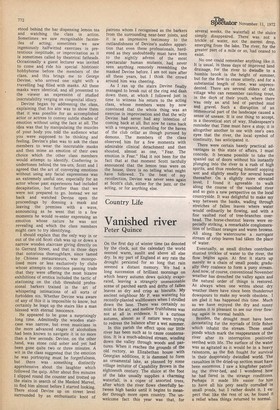Country Life
Vanished river
Peter Quince
On the first day of winter time (as denoted by the clock, not the calendar) the world seemed warm, sunlit and above all else dry. In my part of England at any rate the drought persisted for so long that rain seemed a distant memory. We had a long succession of brilliant mornings on which heavy autumn dews quickly evaporated, leaving a strangely unseasonable scene of parched earth and drifts of fallen leaves as dry and crisp as biscuits. My ancient neighbour Mr P. was watering his recently-planted wallflowers when I strolled down the lane. There was certainly no mist in the air, and mellow fruitfulness was not at all in evidence. It is a curious autumn, almost as if nature were trying to redress the balance after a wet summer.
In this parish the effect upon our little river has been such as to cause consternation. It is a much-admired stream, winding down the valley through woods and pastures. When it reaches the grounds of the old rectory, an Elizabethan house with Georgian additions, it is dammed to form an ornamental lake, as planned by some village imitator of Capability Brown in the eighteenth century. The sluice at the foot of the lake usually supplies a charming waterfall, in a copse of assorted trees, after which the river flows cheerfully between high banks until it begins to meander through more open country. The unwelcome fact this year was that, for
several weeks, the waterfall at the sluice simply disappeared. There was not a trickle of water, not the merest drop, emerging from the lake. The river, for the greater part of a mile or so, had ceased to exist.
No one could remember anything like it. It is usual, in these days of improved land drainage, for the river to dwindle to a humble brook in the height of summer, but for the flow to cease utterly, and for a substantial length of time, was unprecedented. There are several elders of the village who can remember catching trout, in the days of their youth, where there was only an arid bed of parched mud and gravel. Such a disruption of an immemorial part of the landscape caused a sense of unease. It is one thing to accept, in a theoretical sort of way, Shakespeare's reminder that Time must have a stop; it is altogether another to see with one's own eyes that the river, the local symbol of continuity, has anticipated it.
There were certain basely practical advantages in this state of affairs, I must concede. It became possible to take the spaniel out of doors without his instantly plunging into the river in a rush of high spirits, and thus rendering himself sopping wet and slightly smelly for several hours thereafter. On a slightly more elevated level, I found it agreeable to walk along the course of the vanished river and so gain a new perspective on the local countryside. It was delightful to make my way between the banks, wading through stretches of fallen leaves where water would ordinarily be flowing, and with a fine vaulted roof of tree-branches overhead. The horse-chestnut leaves were especially striking, a remarkable conglomeration of brilliant oranges and warm browns. All along the watercourse a surrogate stream of crisp leaves had taken the place of water.
Eventually, as small ditches contribute stunted trickles of water to the river, the flow begins again. At first it starts up merely as a chain of small ponds; gradually they coalesce to form a puny stream. And now, of course, conventional November weather has drenched the valley again and the natural order of things is restored. As always when one writes about dry weather there have since been thunderous downpours to make my words obsolete. am glad it has happened this time. Much as we have enjoyed the dry and sunny autumn it is pleasant to see our river flowing again in normal health.
Besides, the drought must have been devastating for the myriads of little fishes which inhabit the stream. Those small ponds which mark the reappearance of the river after its interruption positively seethed with life. The surface of the water was as agitated as it would be in a heavy rainstorm, as the fish fought for survival in their desperately dwindled world. The casualties in the dried-up section must have been enormous. I saw a kingfisher patrolling the river-bed, and I wondered how he had fared in the strange conditions. Perhaps it made life easier for him to have all his prey neatly corralled in small ponds, but I rather doubt it. I expect that like the rest of us, he found it a relief when things returned to normal.


















































 Previous page
Previous page